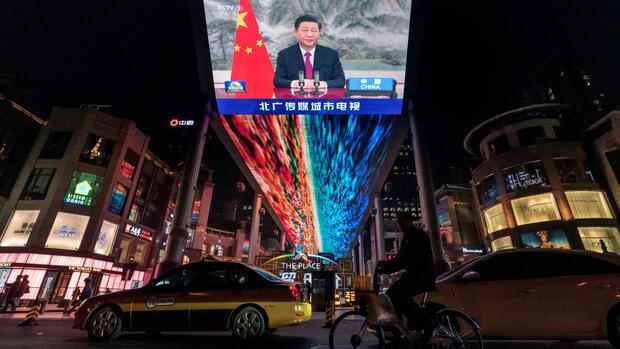Bangkok, Düsseldorf
Surendra Rosha has identified an “unusual level of turbulence in China’s economy” in recent months. The co-CEO of the Asia-Pacific business of the major bank HSBC includes the regulation of the tech industry, turbulence in the huge real estate sector, energy shortages and the pursuit of “general prosperity” as one of these uncertainty factors.
And yet Rosha is in no way concerned. The supposed uncertainty factors are rather a consequence of the “risk reduction” that the Chinese government is currently proactively promoting. The measures would “undoubtedly” lead to building a stronger, more stable, more sustainable economy, “and that will help everyone,” said Rosha at the “Asia Business Insights”, an event organized by Handelsblatt and HSBC in Düsseldorf. Rosha was hooked up via video from Hong Kong.
China has recovered from the Corona slump in early 2020 more quickly than any other major economy in the world. Demand from the People’s Republic saved the world economy from a worse crisis. But now the growth prospects are dim. The main reasons for this are the problems in the important real estate sector and the reluctance of Chinese consumers to buy. The International Monetary Fund (IMF) recently revised its forecast for China downwards slightly, to 8.0 percent for 2021 and 5.6 percent for 2022.
Foreign companies are particularly concerned about the increasing regulation in the handling of data and China’s striving for greater self-sufficiency. The latter is also a response to the ongoing trade war with the US.
But HSBC manager Rosha considers demands for a decoupling to be unrealistic. Anyone who wants a telephone, a car or an X-ray machine today has to accept that it contains Chinese components and US patents, assembled by a machine from Germany. “Or you have to do without telephones, cars and X-ray machines,” he emphasizes. The question is not whether to cooperate, but how.
Top jobs of the day
Find the best jobs now and
be notified by email.
Companies continue to invest in China despite the uncertainties
“Politicians may see domestic political advantages in maintaining the stalemate, but companies are going in the other direction and are voting for a closer bond with their euros, dollars and yen,” said the native of India. China received a record amount of FDI in 2020.
The Indian sees an “unusual level of turbulence in China’s economy.”
This also applies in particular to German companies. Last year, China was Germany’s largest trading partner for the fifth time in a row. According to a survey by the German Chamber of Foreign Trade in China, 72 percent of the German companies surveyed want to expand their investments in China despite the growing uncertainties.
This is especially true for the chemical company BASF. The DAX company plans to invest eight to ten billion euros in a new Verbund site in the southern Chinese province of Guangdong by 2025 – “the largest investment in the company’s history,” says Markus Kamieth, member of the Board of Management at BASF responsible for business in Asia, among other things.
For the chemical industry, “China is by far the most important growth market,” emphasized Kamieth at the event, which again took place hybrid due to the corona. By the end of the decade, China’s share of the global chemical market will increase from 40 percent today to 50 percent. The group has long pursued the strategy of investing and producing where the most important sales markets are. This localization has paid off in the past few months.
“A region of opportunities”
Delivery Hero boss Niklas Östberg also described a strong localization of his business model as a key success factor in Asia. The DAX group is represented in twelve Asian markets and generates 46 percent of its sales there. “We have managed to find the right balance when it comes to acting locally while using the levers of a global team,” he said.
The delivery service provider is not active in China and primarily focuses on South and Southeast Asia on the continent. The Foodpanda brand, which is active there, received 2.5 million orders per month three years ago. There are now 70 million, said Östberg. In South Korea, the company reports more than 100 million orders per month – with a population of around 50 million. “From our point of view, Asia is a region of opportunities,” commented the CEO.
International corporations also see good growth prospects in India – and are therefore increasing their commitment on the subcontinent. The government in New Delhi reported record levels of foreign direct investment in the past fiscal year, which ended in March: Despite the corona crisis, it rose by ten percent to 81.7 billion US dollars.
“It is very encouraging for me to see that international investors recognize the opportunities,” said HSBC manager Rosha. He highlighted the rapid growth of the Indian start-up scene, which this year produced several dozen so-called unicorns, i.e. start-ups with a valuation of more than a billion dollars. International venture capitalists have recently turned increasingly to India’s technology sector after stricter regulation in China dampened prospects there. Rosha also referred to business-friendly reforms of the Indian government under Prime Minister Narendra Modi, such as the reduction in corporate taxes decided two years ago and planned infrastructure investments of 1.4 trillion US dollars in the years 2019 to 2023.
According to forecasts by the IMF, India will have the fastest growing economy of all G20 countries with a growth rate of 9.5 percent this year. The rapid increase is mainly due to the weak previous year, when the gross domestic product shrank by more than seven percent due to extremely strict corona lockdowns. But according to the forecasts of the IMF economists, India will continue to lead the growth rankings in the coming year – and with a plus of 8.5 percent it will be well ahead of China.
More: Asia Business Insight in livestream
